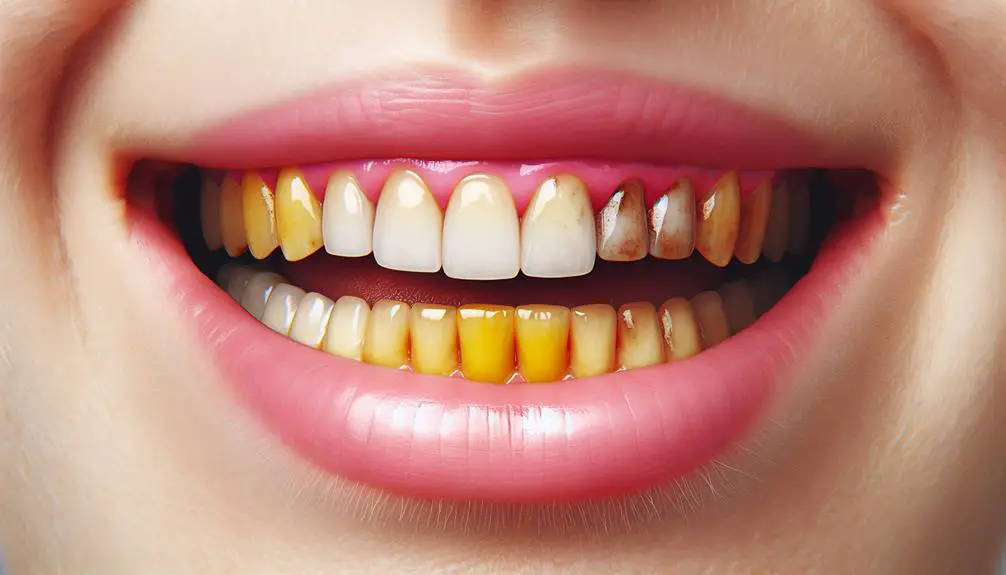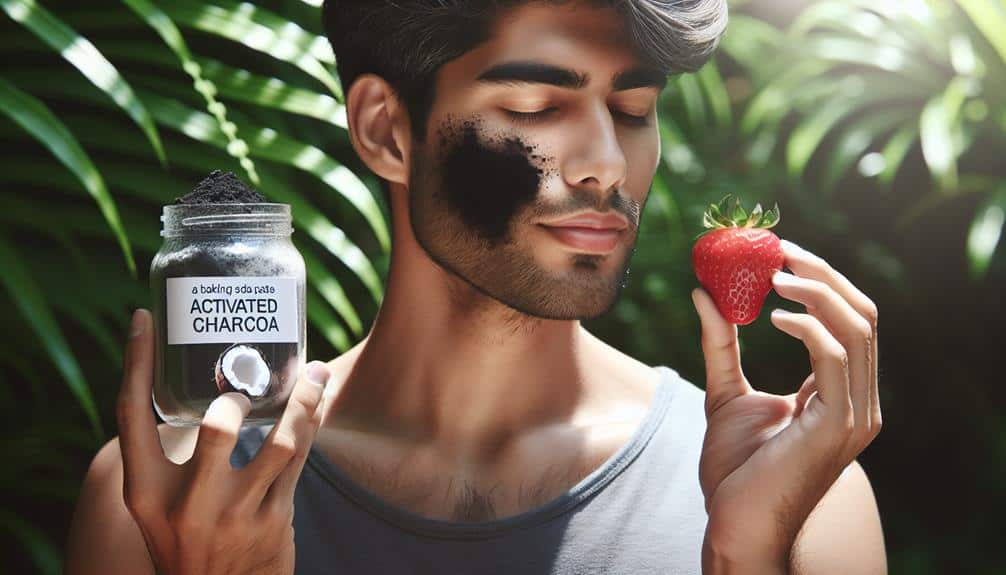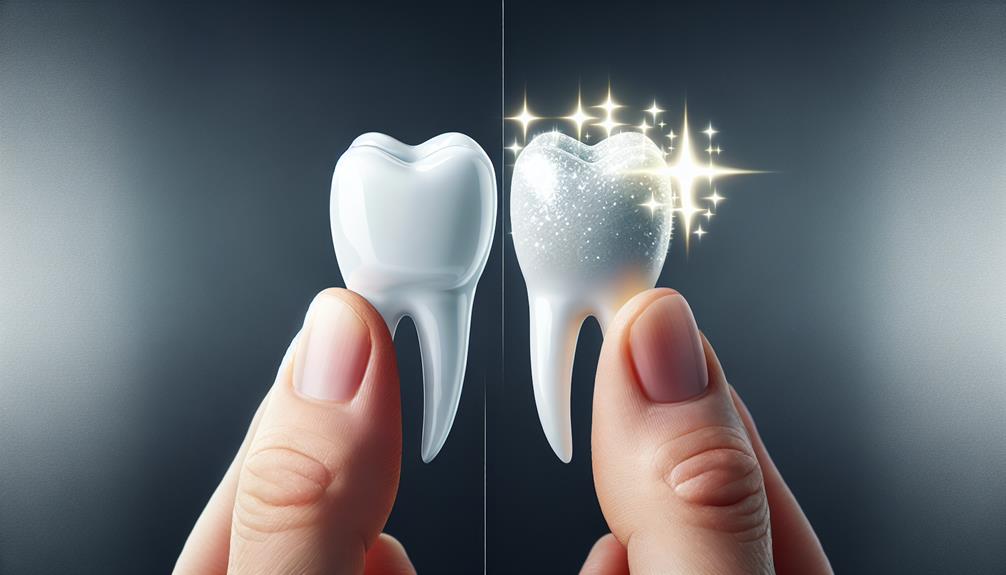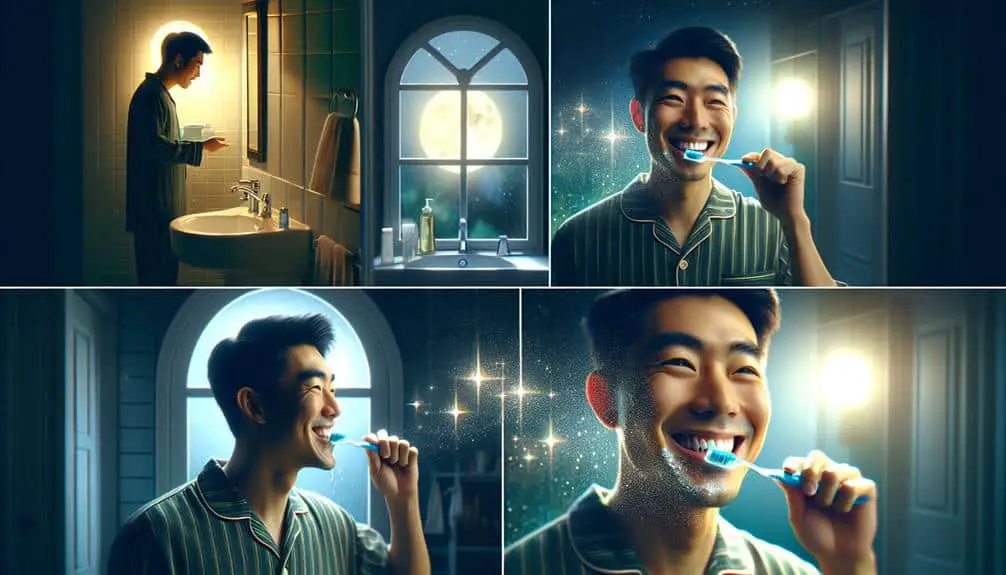If you're looking to achieve lasting results for brightening stained teeth, understanding the causes and effective whitening techniques is essential. Stained teeth often result from dietary habits like coffee and red wine, where chromogens attach to enamel, causing discoloration. Professional whitening treatments with high-concentration bleaching agents can swiftly remove stubborn stains, while natural remedies like baking soda may offer some assistance. Proper oral hygiene practices, such as brushing with fluoride toothpaste and flossing daily, are vital to prevent staining.
Exploring professional whitening options, including customized treatments with higher concentrations of whitening agents, can lead to more long-lasting results. Lifestyle habits like opting for teeth-friendly foods and maintaining excellent oral hygiene play a significant role in achieving a brighter smile. Mastering these foundational principles is key to achieving a radiant smile that endures.
Key Points
- Professional whitening treatments provide long-lasting results.
- Maintain oral hygiene to preserve whitening effects.
- Avoid staining foods and beverages for sustained brightness.
- Regular dental check-ups ensure lasting whitened teeth.
- Use whitening products recommended by dental professionals.
Understanding Stained Teeth Causes
To understand the causes of stained teeth, it's essential to explore the intricate processes that lead to discoloration in tooth enamel. Stained teeth can result from various factors, with preventive measures playing a vital role in maintaining a bright smile. One significant contributor to tooth discoloration is dietary habits. Consuming foods and beverages such as coffee, tea, red wine, and deeply pigmented fruits like berries can lead to staining over time. These items contain chromogens, compounds that attach to the enamel and cause visible discoloration.
To mitigate the impact of dietary habits on teeth, it's advisable to rinse your mouth with water after consuming staining foods or drinks. Additionally, using a straw when drinking beverages that may stain teeth can help minimize direct contact with enamel. Practicing good oral hygiene, such as brushing and flossing regularly, can also aid in preventing staining. By being mindful of your dietary choices and implementing simple preventive measures, you can work towards maintaining a brighter, stain-free smile.
Effective Whitening Techniques
One effective method for brightening stained teeth is through professional teeth whitening treatments. These treatments are conducted by dental professionals and involve the use of high-concentration bleaching agents to remove stubborn stains effectively. Professional whitening treatments are known for their quick and significant results, making them a popular choice for those seeking a noticeable change in the appearance of their teeth.
Natural remedies and DIY treatments are also options for teeth whitening, although their effectiveness may vary. Some natural remedies like baking soda and hydrogen peroxide have been touted for their whitening properties, but it's important to use them cautiously to prevent damage to the enamel. DIY treatments such as whitening strips and charcoal toothpaste are widely available, but their results may not be as consistent or long-lasting as professional treatments.
When considering whitening techniques, it's important to consult with a dental professional to determine the most suitable option for your specific needs. While natural remedies and DIY treatments can be cost-effective, professional whitening treatments offer a more reliable and efficient way to achieve lasting results in brightening stained teeth.
Maintaining Whitened Teeth
When it comes to maintaining the brightness of your whitened teeth, consistent oral hygiene practices play an important role in preserving the results of your whitening treatment. Proper home care is essential for ensuring that your teeth remain white for longer periods. Brush your teeth at least twice a day with a fluoride toothpaste to remove surface stains and prevent discoloration. Flossing daily helps to eliminate plaque buildup between teeth, which can cause staining over time. Additionally, using a mouthwash containing hydrogen peroxide can help maintain the whiteness of your teeth by reducing bacteria in the mouth.
Incorporating preventative measures into your daily routine can also aid in preserving the effects of your whitening treatment. Avoid or limit consumption of foods and beverages known to stain teeth, such as coffee, tea, and red wine. Rinse your mouth with water after consuming these items to minimize their staining effects. Finally, regular dental check-ups and professional cleanings are important for detecting any early signs of discoloration and maintaining excellent oral health. By following these practices diligently, you can extend the duration of your whitened teeth.
Professional Whitening Options
Considering the latest advancements in dental technology, professional whitening options offer effective solutions for achieving a brighter smile with lasting results. Advanced technology plays an essential role in enhancing the whitening process. Techniques such as laser whitening or light-activated whitening systems are examples of how technology has revolutionized professional treatments, providing quicker and more efficient results compared to over-the-counter products.
Moreover, professional whitening options provide customized treatments tailored to individual needs. Dentists assess the level of staining, oral health condition, and desired results to create personalized whitening plans. Customized treatments guarantee that the whitening process is safe, effective, and optimized for each patient. Additionally, professional whitening treatments often use higher concentrations of whitening agents than over-the-counter products, leading to more significant and longer-lasting results.
Lifestyle Habits for Brighter Teeth
Want to maintain a brighter smile? Let's explore some lifestyle habits that can help keep your teeth looking their best. When it comes to dietary choices, opting for teeth-friendly foods can make a significant difference. Foods high in sugar and acidity can contribute to staining and enamel erosion. Instead, incorporate crunchy fruits and vegetables like apples and carrots, which can help naturally clean your teeth and increase saliva production, aiding in the removal of food particles and bacteria.
In addition to dietary choices, maintaining excellent oral hygiene practices is essential for a bright smile. Brushing your teeth at least twice a day with a fluoride toothpaste, flossing daily, and using an antiseptic mouthwash can help prevent staining and keep your teeth healthy. Proper oral hygiene not only removes surface stains but also prevents plaque buildup, which can lead to discoloration over time.
Frequently Asked Questions
Can Stained Teeth Be a Sign of Underlying Health Issues?
Stained teeth can indicate more than just cosmetic concerns. Regarding dental health, they may signal issues like decay or poor oral hygiene. Additionally, certain medical conditions, such as digestive problems or medications, can contribute to discoloration.
Are There Any Natural Remedies for Whitening Teeth That Are Effective?
For effective teeth whitening, consider natural remedies that offer a holistic approach. Some options, like oil pulling with coconut oil, baking soda paste, or activated charcoal, can enhance oral health while brightening your smile.
How Long Does It Typically Take to See Noticeable Results From At-Home Whitening Products?
When using at-home whitening products, results vary based on individual factors like starting shade and product used. Typically, noticeable changes appear after 1-2 weeks of consistent use. Remember, patience is key for effective whitening.
Are There Any Foods or Drinks That Can Help Prevent Teeth Staining?
To prevent teeth staining in your diet, focus on foods high in fiber and water like fruits and vegetables. Choose beverages like water, milk, and green tea that can help protect your teeth.
What Are the Potential Risks or Side Effects of Professional Whitening Treatments?
When contemplating professional whitening procedures, you should be mindful of potential risks such as tooth sensitivity, gum irritation, and uneven results. It's important to follow precautions recommended by your dentist for optimal outcomes.
Conclusion
You've learned about the causes of stained teeth and effective whitening techniques, but how do you make those results last?
Just like tending to a garden, maintaining your whitened teeth requires ongoing care and attention.
By consistently practicing good oral hygiene habits and avoiding staining substances, you can keep your smile bright and vibrant for years to come.
Remember, just like nurturing a plant, with the right care, your teeth can continue to shine brightly.



